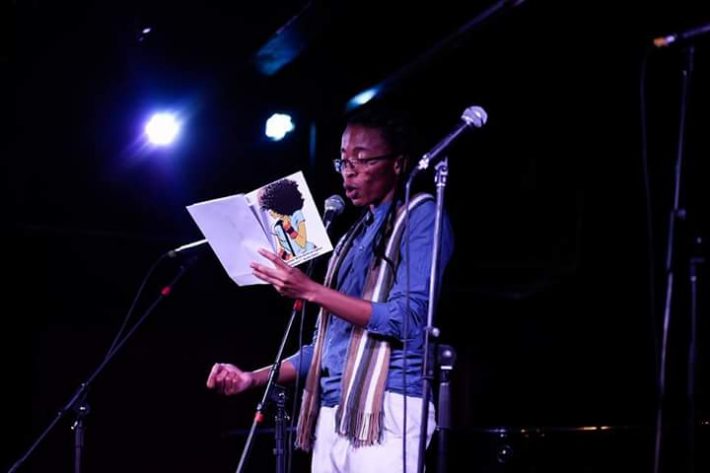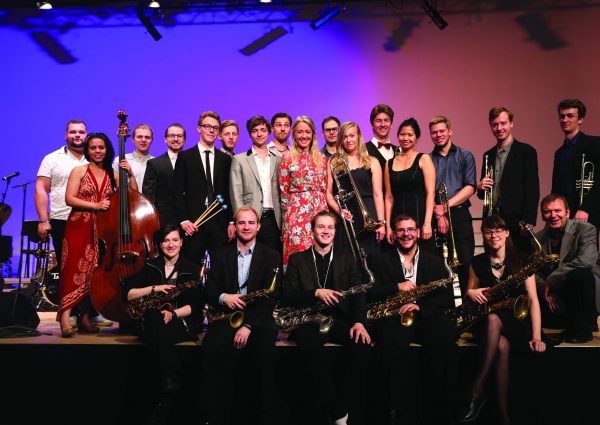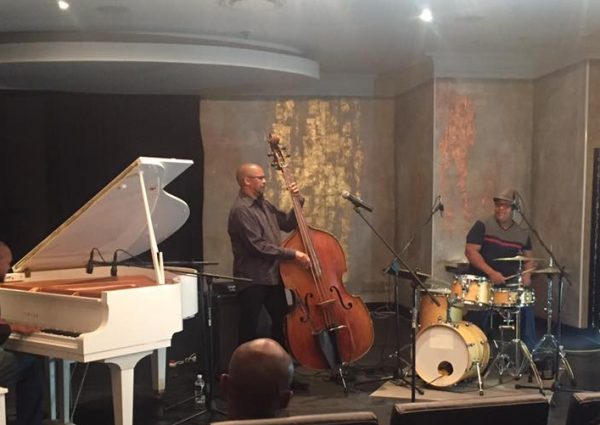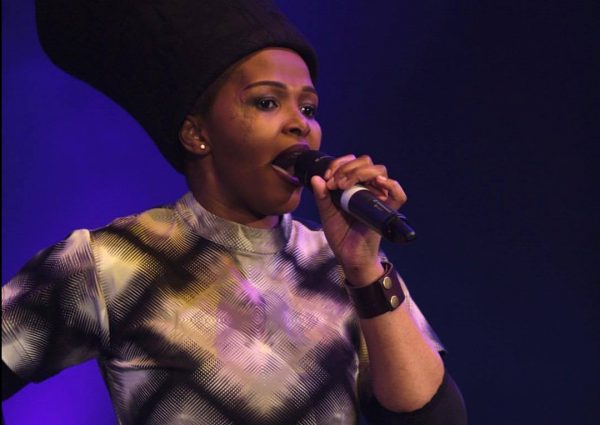When poetry shows are attended by audiences who are attracted to the art and not narcissistic proclivities, both the poet and the industry grow, says Mpho Matsitle.
“The brain appears to possess a special area which we might call poetic memory and which records everything that charms or touches us, that makes our lives beautiful.” ~ Milan Kundera
Poetry is an attempt at beauty, if not beauty in and of itself. It is thus difficult to stand in judgement of beauty, to ignore one’s poetic memory and zoom in on the dirt engulfing the diamond. But such is the burden of the untalented; we have no luxury to only bask in the glory of all that charms us and makes our lives beautiful. We also have to do the uncouth thing and ask, “It’s beautiful, but what does it mean?”
To answer this crude question we will look into the state of the love-triangle between the poet, poetry and audience; then try to make meaning of the poetry; and finally have a glance at the state of the poetry movements. Therein we will put under microscope the challenges and offer perfunctory remarks on how best to overcome them.
Applause for no cause
“I’ve realised that applause is very dangerous, applause kills. But then again, so is the opposite.” ~ Lesego Rampolokeng
Poetry is not new —poetry is as old as humanity itself. The South African poetry scene in particular has a rich archive; many an anthology has been published, many a record has been made, and a healthy dose of these is available at no cost on the internet and in libraries.
Many South African poet laureates are readily accessible via social media.
It thus makes no sense whatsoever that the local Mangaung poets write, organise and perform as if they are breaking new ground or doing something out of the ordinary.
It is not entirely implausible that some of our local poets and audiences haven’t engaged with Gwala, Rampolokeng, Tladi et al. This idea of breaking new ground, or to be less kind, doing something special or out of the ordinary, is what undergirds the apparent arrogance that permeates the local poetry scene.
Poets – and audiences alike – think themselves special for doing poetry, rather than, say, the more common art forms like hip hop. This arrogance then acts as an impediment from putting in the work.
It thus comes as no surprise that a person would take to the stage, relate an inconsequential tale or baseless opinion with no imagery, no rhythm, nothing whatsoever, and call it poetry. And worse still; we applaud.
This arrogance also displays itself in the audience via their lack of attention and their general disdain for poets on stage. The danger is that poetry has become cool (although one might find joy in this given what it means for poetry’s economic sustainability; at the same time, it is cause for concern as cool kids aren’t known for their listening appetite that’s demanded at poetry shows).
This ADHD is what has led to poetry shows “needing” musicians or comedians to keep the audience attentive or “entertained”, as if poetry is supposed to be entertaining.
Believing themselves to be ‘above’ the others; that they are more cultured, more refined, the audience sees no need to listen to the poets as they perform. That they are there, that they have checked in and will score a few selfies with the poets is more than enough in our social media crazed era wherein it is more important to be seen doing something than to actually do it. They need not then go the extra mile and actually listen to the poet on stage. But they will most definitely applaud as the poet descends the stage.
These two ingredients make for a disastrous recipe; the non-listening audience, in their applause for no cause, give false feedback to the already compromised poet. With this compromised poet, self-aggrandising verses are dominating the stage.
If we were at all serious about poetry, we would not let this heresy go on unchallenged. We would demand of the poet who gets on stage and claims they’re the best ever born to furnish us with a critical appreciation of the work of Dennis Brutas and show us how theirs eclipses.
But we do not. We do not because we do not listen. Instead we applaud, and they step off believing that indeed they’re the best ever to do it.
And because we do not listen, we cannot ascertain whether or not the claims to greatness hold any water. Given that assent costs less than dissent, we chorus that indeed they’re the best to ever do it, thereby feeding the ever vicious cycle of applause for no cause.
This poetry makes no sense
“Just because a poet has been granted poetic license, cannot guarantee any form of sense.” ~ Icebound Makhele
No obstacle is insurmountable. Some of our poets, through hard work or sheer talent, manage to survive the vicious cycle of applause for no cause. They manage to get on stage to dazzle our third eye with beautiful imagery, blow our hearts with wrenching metaphors and tickle our cochlea with sweet alliterations. They give multiple and layered meanings to words over and above their prosaic ostensible meaning. They bend language to their will, they force us to laugh, will us to cry, and generally do with our emotions and thoughts as they please.
It’s too beautiful. But seemingly seduces one to slumber. It was Molemi who taught that ‘poetry is both lyric and content.’ In tandem Icebound asserts that it makes no sense:
If it’s only for the beauty of the words,
For the rhythm in the rhyme,
For the incomprehension of the present tensions,
It makes no sense to the now,
It rears no warning signs to the future,
As it bears no clue to the past…
What are we to make of poetry that is beautiful but is silent? That has nothing to offer the black; that keeps silent while blacks are daily Marikanised? That had nothing to say but blunt roses when Tatane got murdered and spoke of Greek gods and oracles when UFS moered blacks? That called for a return to some mystical Africa when Mswati raped yet another maiden and praises the 94 ‘miracle’ when Pelonomi kills black babies by the hundreds?
Should it not then just do us all a favour and keep its metaphors and similes to itself?
This treacherous poetry deserves nothing less but to be erased from all memory, more especially the poetic memory.
This of course is an old debate, but one that is always worth having. Nina Simone put it succinctly: “You can’t help it. An artist’s duty, as far as I’m concerned, is to reflect the times.”
It is not often that we find the times reflected in Mangaung’s poetry scene. More often than not the zeitgeist is not only absent but obfuscated. We had to read in the media, for instance, that the University of the Free State is a racist and sexist institution; our poets only cared to tell us about its famous chips from The Deli.
What does it tell us that in this milieu of decolonisation, wherein there’s a wave to assert Africa as a standard for beauty and thought, our poets are not ashamed to get on stage and speak of Greek mythology, ancient Asian religions and have Celtic music as their soundtrack?
Clearly they have taken a side against the people, when they can be so passionate about an organic vegan lifestyle when millions of our people go to bed hungry daily.
This socio-political silence is not innocent neutrality; it is in itself a position. It is deceitful, because as Ernst Fischer says, “In a decaying society, art, if it is truthful, must also reflect decay. And unless it wants to break faith with its social function, art must show the world as changeable. And help to change it.”
Otherwise, this poetry makes no sense.
Fak’imali uzobona?
Mangaung is littered with poetry movements. In fact some have intimated that every poet gathers their friends and they start a movement. Each movement has its own thing going – limping from one end to the next – with its own audience and even venues.
Some have access to formal art facilities; some are homeless – begging this and that club owner to host them. What becomes apparent when one traverses through all these movements is that there is no cross-pollination; you hardly ever see members of one movement at another movement’s show. Each keeps to their own.
They all have the same complaints: lack of funding being the chief among them. The fact is, Mangaung is too small to have so many poetry movements. All of them must, as a matter of necessity, consolidate into one monolithic block. Have one movement and run it like a business with proper structures, adopt the Word N Sound Literature Company model: weekly sessions, monthly slam competitions, poetry league, and regular festivals.
And add a social development aspect to it as they do. This way not only is there cross-pollination and the concomitant organic funding, but there’s also a product worthy of investment.
Investment can also be in the form of time. Some key resources the various movements and organisers lack are not just financial and infrastructural, but also basic things like respect, honesty and professionalism.
The tardiness and non-delivery that has become a staple diet of many events has led to many art lovers choosing to stay home rather than invest their time and money as what you see on the poster is hardly ever what you get. So, it is not just funding that is lacking, although one can never discount the necessity thereof.
For the broad masses of the people
When last did we see a poetry show at any taxi rank or any space where masses gather? That Motheo is not promoting you or Pacofs isn’t paying you much attention does not mean there’s no space for poetry. One can’t rebel and be a skhothane at the same time.
Poets must get a generator, mic and speaker system and join the gospel, kwaito and Famo musicians at the taxi ranks so they can be known and sell their art.
When poetry shows are attended by audiences who are attracted to the art and not narcissistic proclivities, both the poet and the industry grow.







Psyconik OKE FS
Super great read…resonates across many genres…people hardly talk about a poet’s piece post an event…we tend to ignore such warnings and still wonder why people aren’t enthusiastic about attending next shows…a real eye opener
Rallying Against Reality Art – Art State
[…] the poetry was simply unimaginative, taciturn and unstylish – testament to the shoddy state of Mangaung poetry. The writers, in an ironic Freudian slip, apparently admit to this when they have an angry Vosho […]